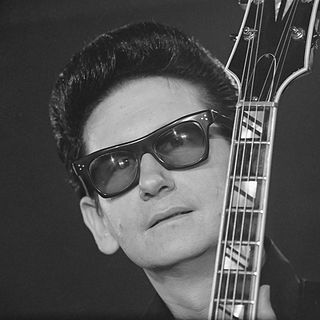
Roy Kelton Orbison was an American singer, songwriter, and guitarist known for his distinctive and powerful voice, complex song structures, and dark, emotional ballads. Orbison's music is mostly in the rock music genre and his most successful periods were in the early 1960s and the late 1980s. He was nicknamed "The Caruso of Rock" and "The Big O". Many of Orbison's songs conveyed vulnerability at a time when most male rock-and-roll performers projected strength. He performed with minimal motion and in black clothes, matching his dyed black hair and dark sunglasses.

Crying is the third album by Roy Orbison, released in 1962. It was his second album on the Monument Record label. The album name comes from the 1961 hit song of the same name. In 2002 the song was honored with a Grammy Hall of Fame Award, and In 2004, it ranked #69 on Rolling Stone Magazine's "500 Greatest Songs of All Time". The album was ranked No. 136 on Pitchfork's 200 Best Albums of the 1960s. Crying also features Multiple covers songs including "The Great Pretender", & "Love Hurts" and the early recordings of "She Wears My Ring"
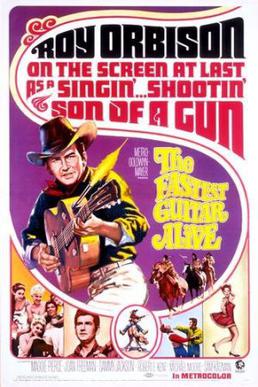
The Fastest Guitar Alive is a 1967 American musical comedy Western film directed by Michael D. Moore and starring singer Roy Orbison in his only acting role. The film features Orbison performing seven original songs, which appeared on his 1967 MGM album of the same name. His song "There Won't Be Many Coming Home" is featured in the 2015 western film The Hateful Eight.

Roy Orbison's Greatest Hits is a Roy Orbison record album from Monument Records recorded at the RCA Studio B in Nashville and released in 1962. Between the hit songs were also "Love Star" and "Evergreen" which were released here for the first time. "Dream Baby" had recently been a No. 4 hit in the United States and No. 2 in England.

In Dreams is the fourth studio album by American singer Roy Orbison, released in July 1963 by Monument Records. recorded at the RCA Studio B in Nashville, Tennessee. It is named after the hit 45rpm single "In Dreams".

More of Roy Orbison's Greatest Hits is a Roy Orbison album from Monument Records recorded at the RCA Studio B in Nashville, Tennessee and released in 1964. The songs "It's Over" and "Indian Wedding" were recorded at the Fred Foster Studios also in Nashville.
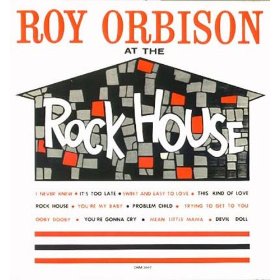
Roy Orbison at the Rock House is the first album by Roy Orbison on the Sun Records label, released in 1961 at a time when Orbison had already moved to the Monument label. Sun Records owner Sam Phillips had a collection of songs Orbison had recorded at Sun during 1956–1958. Phillips capitalized on the national recognition Orbison had achieved at Monument through three major hit singles in 1960 and 1961 that had gone to the top of the Billboard charts.

Early Orbison is an album recorded by Roy Orbison on the Monument Records label at the RCA Studio B in Nashville, Tennessee, and released in 1964. Essentially a compilation of songs from his first two Monument albums, it is most noteworthy for containing "Pretty One", the "B" side of Orbison's second Monument single, "Uptown". Many Orbison fans believe "Pretty One" would have been his first major hit had it been promoted as an "A" side. The second song of interest on this album is "Come Back to Me My Love" which Fred Foster, owner of Monument Records and producer of all of Orbison's earliest hits, says was the song which inspired production of the hit arrangement that later became "Only the Lonely".
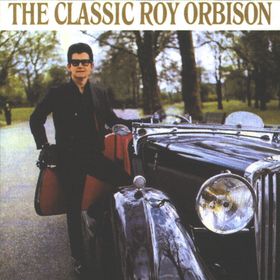
The Classic Roy Orbison is the ninth studio album recorded by Roy Orbison, and his third for MGM Records, released in July 1966. The single taken from it, "Twinkle Toes", was Orbison's last US top-forty single during his lifetime, scraping in at No. 39. It reached No. 24 in Australia and No. 29 in the UK. The album spent eight weeks on the album chart in the UK, peaking at number 12.
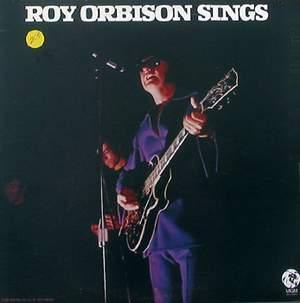
Roy Orbison Sings is the sixteenth album recorded by Roy Orbison and the ninth for MGM Records, released in May 1972. Around this time, Orbison's hit singles had well and truly dried up, but this album is said to be one of his finest.

Orbisongs is a compilation LP released by Monument Records in 1965 after Roy Orbison had left the label and joined MGM. It features tracks such as the stereo version of "Oh, Pretty Woman", a different version of "Dance", and the unreleased "I Get So Sentimental."
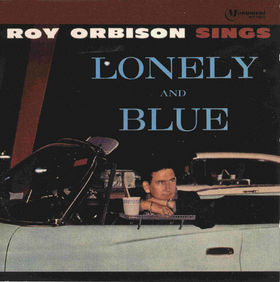
Lonely and Blue is the debut studio album by Roy Orbison, released on Monument Records in January 1961.

The Orbison Way is the eighth album recorded by Roy Orbison, and his second for MGM Records, released in January 1966. Two singles were taken from the album — "Crawling Back" and "Breakin' Up Is Breakin' My Heart" — both of which were chart hits in England, the US and Australia.

Roy Orbison Sings Don Gibson is a tribute album recorded by Roy Orbison for MGM Records. Released in January 1967, it is a collection of songs written by Country Music Hall of Fame singer/songwriter Don Gibson who, like Orbison, often wrote about the loneliness and sorrow that love can bring. Its one single, "Too Soon to Know", became a smash hit in the UK, reaching #3 there in September 1966, and also reached no. 4 in Ireland and no. 27 in Australia. In Canada, the song only reached no. 71.

Cry Softly Lonely One is the twelfth music album recorded by Roy Orbison, and his sixth for MGM Records. The album was released in October 1967 and included two singles: "Communication Breakdown" and the title tune, both of which were minor hits in the States early that year. "Communication Breakdown" did much better in Australia, where it reached No. 9 in February. According to the official Roy Orbison biography, the London Records release of this album featured the extra track "Just One Time".
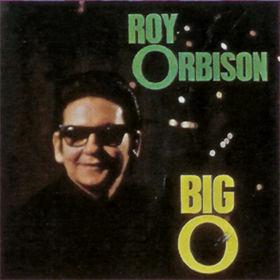
The Big O is the fifteenth music album recorded by Roy Orbison, and according to the authorised Roy Orbison biography, his second for London Records in the United Kingdom. The music and backing vocals were provided by English group, the Art Movement on all tracks except for "Penny Arcade", which was a studio recording and was released as a single in 1969, peaking at No. 27 in the UK and was Orbison's last UK chart success during his lifetime. "Penny Arcade" was also his biggest hit in Australia, spending four weeks at number one around Christmas 1969. The second single, "Break My Mind", was Orbison's last Australian chart success during his lifetime, reaching #24 in March 1970. The album was released in Europe in early 1970.

Hank Williams: The Roy Orbison Way is the fourteenth album recorded by Roy Orbison, and his eighth with MGM Records, released in August 1970. It is a tribute album to the songs of honky tonk singer Hank Williams, whom Orbison listed among his influences. The album was a critical failure and it sold poorly—Fred Foster said it was "an exercise in futility." The exclusively North America release remained relatively unknown to Orbison fans until it was repackaged on Compact Disc in 2009 along with the popular 1967 Don Gibson tribute album Roy Orbison Sings Don Gibson. The album was also included in the 2015 box set The MGM Years 1965–1973 – Roy Orbison.
"It's Over" is an American song composed by Roy Orbison and Bill Dees and sung by Orbison. The single was produced by Fred Foster and engineered by Bill Porter.

"Oh, Pretty Woman", or simply "Pretty Woman", is a song recorded by Roy Orbison and written by Orbison and Bill Dees. It was released as a single in August 1964 on Monument Records and spent three weeks at number one on the Billboard Hot 100 from September 26, 1964, making it the second and final single by Orbison to reach number one in the United States. It was also Orbison's third single to top the UK Singles Chart, where it spent three weeks at number one.
"Claudette" is a 1958 song which reached number 1 in the UK Singles Chart that year in a recording by the Everly Brothers. It was the first notable success as a songwriter for Roy Orbison, who named it after his first wife. Orbison also recorded his own version of the song. Although originally released as the B-side to the Everly Brothers' number 1 hit "All I Have to Do is Dream", their recording of "Claudette" reached number 30 in its own right, and the two songs were jointly listed at number 1 in the UK.


















